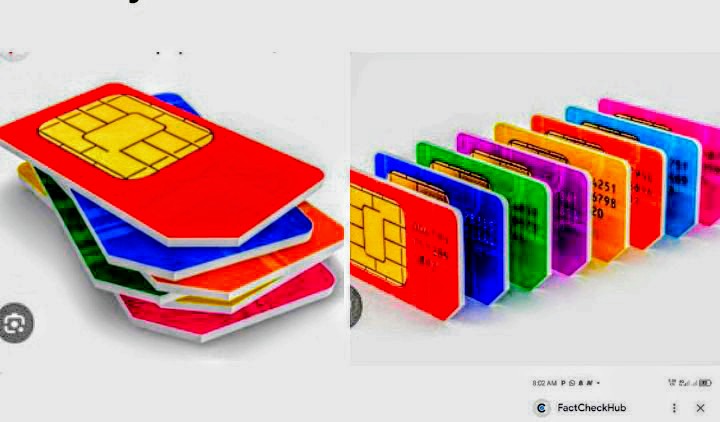
In a remarkable stride towards self-sufficiency, the Nigerian Communications Commission (NCC) announced that all SIM cards used within the country are now manufactured locally. This achievement marks a significant milestone in Nigeria’s telecommunications sector, highlighting the nation’s growing technological capabilities and commitment to domestic production. By ensuring 100 percent local manufacturing of SIM cards, Nigeria not only boosts its economy but also strengthens its position in the global tech arena.
During a media training session in Lagos, Engr. Babagana Digima, Head of New Media and Information Security at the Nigerian Communications Commission (NCC), delivered an insightful address to media executives. He emphasized the critical role of robust information security practices in today’s digital landscape, urging media professionals to stay ahead of emerging threats and leverage new media technologies to enhance their operations. The training aimed to equip participants with the knowledge and skills needed to navigate the evolving challenges of the media industry effectively
The News Agency of Nigeria recently hosted a dynamic two-day training program entitled “Upskilling Media Stakeholders on Trends in Telecommunications.” This event aimed to enhance the skills of media professionals by providing in-depth insights into the latest developments in the telecommunications industry. Attendees had the opportunity to engage with experts, explore cutting-edge trends, and gain valuable knowledge to stay ahead in the rapidly evolving media landscape. The training highlighted the critical role of telecommunications in shaping modern media practices and equipped participants with the tools needed to navigate this ever-changing field effectively.
Digima credited the achievement to the commission’s dedication to fostering local content and indigenous involvement in the telecommunications industry. This success was driven by initiatives from the Nigeria Office for Development in Indigenous Telecommunications Sector (NORDIT), showcasing their efforts to empower homegrown talent and businesses in the sector.
“The NCC by Section 1D to F of our Act has spelt out our function to encourage indigenous participation of telecom companies as well as the national policy for promotion of indigenous content in the telecommunications sector which established NORDIT.
“Previously, in the last two years, almost 99 percent to 100 percent of SIM cards in Nigeria were imported.
“And when NORDIT came, we made it one of our key low-hanging fruits that in five months to six months, manufacture of SIM cards will be indigenous.
“We directed all the Mobile Network Operators (MNOs) to source their SIM cards locally, and in fact, as at now, 100 percent of all the SIM cards used in Nigeria are manufactured locally, no importation,” Digima said.
Digima, the ex-leader of NORDIT, highlighted the commission’s significant efforts through NORDIT in promoting the active involvement of indigenous companies and individuals across the telecom industry. Their advocacy work aimed to ensure that local talents and enterprises played a central role in every facet of telecommunications, fostering inclusivity and broad-based participation.
He mentioned that NORDIT had bolstered the industry by offering grants and incentives to various companies, ensuring steady growth and innovation in the sector.
“For now, we are currently sponsoring the manufacture of Corrugated Ordinal Duct, and the company that will be established will be the first in the whole of Africa to manufacture such a product.
“We also encourage tower manufacture, fibre manufacture and have been in touch with Coleman Cables, which are currently manufacturing fibre cables.
“They have even overtaken the only company in Egypt in manufacturing capacity and they are expanding.
“I am sure a lot of companies are very happy with what we have done,” he said.
Dr. Aminu Maida, the Executive Vice-Chairman of the NCC, emphasized the importance of the initiative to upskill senior media executives. This program was developed to enhance the understanding and communication between the commission and the public. By bridging this gap, the NCC aims to foster a more informed and accurate representation of its work and objectives.
Maida, represented by Engr. Abraham Oshadami, the Executive Commissioner of Technical Services at the Nigerian Communications Commission (NCC), emphasized the necessity for the commission to create a system that helps consumers and stakeholders comprehend the inner workings of the telecommunications industry.
“These have led to the birth of this beautiful initiative. If our industry must succeed, there must be proper enlightenment and education.
“So, your physical role cannot be overemphasised and that is why these are carefully selected executives from across all platforms, including print, broadcast, and the online media.
“It is to enable you to understand the commission and to see the operational interventions that the commission has engaged in over the time, as well as challenges we are having.
“This will enable us to work together to shape the landscape and also to help consumers understand what is really happening,” he said.
He emphasized that their training aimed to build a robust database of key partners across media landscapes, fostering strategic alliances with stakeholders in the industry.









